Best Dental implants Treatment In India
Related By Dentistry
| # | {packageDetails.name} Treatment Cost | Average Price | Price |
|---|---|---|---|
| 1 | How much does a surgery cost in India? | 32000.00 | 30000.00 - 50000.00 |
Package Details
Definition of dental implants
Dental Implants Process : why?
The issue of missing teeth might arise at any time in one's life. Trauma, an accident, serious gum disease, tooth decay, or even poor dental hygiene can all cause tooth loss. If neglected, missing teeth can have a number of negative effects, including:
Speech issues brought on by the void left by one or more missing teeth
Having trouble chewing
As a result of muscular sagging brought on by missing teeth, the face may begin to appear older and wrinkled with sunken cheeks.
Pain in the jaw's facial muscles as a result of the missing teeth's poor bite
Plaque buildup and food entrapment in the space created by the lost tooth will eventually lead to gum disease and tooth decay.
teeth
An improper bite is brought on by the tilting of nearby teeth into the voids left by missing teeth.
Untreated tooth loss can detract from one's looks and lower one's self-esteem or confidence.
hiding one's grin during talks or at public events to prevent humiliation brought on by a toothless smile
All of the aforementioned issues are resolved with the use of dental implant. They are, without a doubt, the greatest and most widely used method of replacing lost teeth. Regardless of age or gender, everyone with missing teeth can benefit from dental implant. Click here to find out if you qualify for dental implant.
With a 98% success rate, dental implants reassure dental patients about the health of their teeth and gums.
In essence, dental implant are when the jaw bone is joined using a "titanium screw."
Bridges vs. dental implants: differences
- Bridges could endanger the nearby natural tooth.
- When bone deterioration at the location of the missing tooth persists, a bridge may occasionally need to be replaced.
- Bridges increase the risk of plaque buildup, tooth decay, and gum disease, as well as the possibility of future root canal therapy
- Implants don't compromise a neighbouring tooth.
- Due to its attachment to the bone and promotion of healthy bone, an implant does not induce bone loss.
- Implants won't ever attract germs for plaque buildup since there are no empty areas between them.
Advantage of Detal implants
- Here dental implants in india replace missing teeth by helping to restore healthy function to the area.
- Implants are a long-lasting treatment option that may even outlive the patient.
- A dental implants in india prevent facial muscles from sagging caused by lost teeth, which can alter the form and contour of the face and grin.
- The surrounding tooth structure is not harmed in any way by dental implant, and healthy bone is protected.
- The best way to replace a lost tooth is with implants, which guarantee greater look, comfort, and no speech difficulties.
- With implants, you can eat your favourite foods without worrying.
Procedure for dental implants
- Modern dental methods make it feasible to perform the implant installation process painlessly and comfortably. Concerned patients may also request anesthesia from the dentist in order to feel at ease throughout the placement of a dental implant.
- The jawbone is first prepared, and the surgeon creates an incision to expose the bone so that drilling holes may be made. In order for the implant to be correctly installed and inserted deeply into the bone, like the root, the holes must remain large enough.
- In situations when the bone is too weak or not strong enough to sustain implant surgery, the doctor may recommend bone grafting. After that, the surgeon waits for the jawbone to heal before inserting the metal post.
- The entire procedure might take several months to complete, with the majority of that time being spent recuperating and watching for the jaw's new bone to form.
- After that, the patient is given a temporary crown to use in order to close the gap and achieve the desired look. In order to remove this crown for an implant operation, one must wait until the bone has fully healed.
- The jawbone will expand and fuse with the dental implant surface throughout this procedure.
- This procedure, also known as osseointegration, aids in providing a sturdy foundation for the new artificial tooth, similar to what the roots provide for real teeth.
- Depending on the shape and quality of the bones, this procedure typically takes between three and six months. However, when patients have healthy bone structure, the entire treatment can be finished in a single day.
- The second operation can then be scheduled, but only after the implants have merged with the bone.
- Dentist will take an x-ray to determine whether the implant is suitable for the second procedure.
- The second operation will be less complicated than the first, which involved
- After your recuperation is complete, you could require additional operation to insert the abutment (the component to which the crown will adhere). This very straightforward surgery is frequently done in an outpatient environment under anaesthesia.
- To attach the abutment to the dental implant during the operation, the dentist will reopen the incision. For four to six weeks, a temporary crown will be applied while the gums around the abutment recover. Such a crown can cushion the implant and may put stress on the soft tissues, which can aid in healing. It is softer.
- After each step of surgery, you might need to refrain from eating anything but soft foods as a precaution to allow the surgical site to recover correctly.
- The following stage,the dentist will concentrate on making the permanent crown resemble your natural teeth in every way. The morphology, surface texture, and colour will all be adjusted to mix in with the nearby teeth.
- Consult your dentist if you have any issues with the crown so that the dental technician may make the required adjustments.
- To create the crown, impressions of your mouth and remaining teeth are obtained in order to create an artificial tooth that seems natural. But the crown won't be put in until the jawbone is robust enough to hold the new tooth.
- A permanent crown may be created in under two to three weeks and is then screwed or cemented into place.
- And yoyu checkout the dental implants india cost and dental implant price and procedure by clicking ace medicare
Post-operative instructions for Dental implant
- After a dental implant operation, abide by these post-operative guidelines, and never hesitate to visit a doctor with
any questions or concerns:
- On the day of operation, avoid touching, spitting on, or washing the wound. Avoid touching the metal healing abutment that protrudes through the gingival tissue.
- It's typical to experience some bleeding or redness in the mouth for 24 hours following implant surgery. Bite on a gauze pad that has been applied to the bleeding site for 30 minutes to stop excessive bleeding.
- Ask your dentist for more guidance if the bleeding does not cease.
- After surgery, swelling is normal. Use an ice pack on the cheek near the surgery site to lessen it (you can also use a plastic bag or an ice-filled towel). Use the.
- Cost of dental implant
- Some people may be concerned about the price of dental implant, however they are not too expensive. Each treatment involves a number of steps, which gives the impression that implants are pricey.
- It is crucial to realise that if a missing tooth is not replaced with an implant, the neighbouring teeth will eventually start to move and jawbone loss will begin, which will ultimately cost significantly more to treat than a single dental implant.
Care for post-implants
- In order to maintain proper oral hygiene, brush twice day.
- Make sure to pick a toothbrush with a tiny head and gentle bristles.
- To avoid damaging your teeth and gums, replace the bristles on your toothbrush every two to three months.
- When brushing, go slowly, thoroughly, and avoid using too much power since this might result in abrasion.
- Maintain healthy implants by flossing at least once a day to remove plaque, germs, and food particles stuck between the teeth.
- Take good care of your teeth at home to maintain your dental implant.lasting forever
- To maintain good dental health, use mouthwash once day after meals.
- Avoid eating sticky foods since implants can harbour more germs due to their artificial nature than your natural teeth.
- Eating and drinking healthfully helps keep your implants out of harm's way, and with proper dental care, they can last a lifetime.

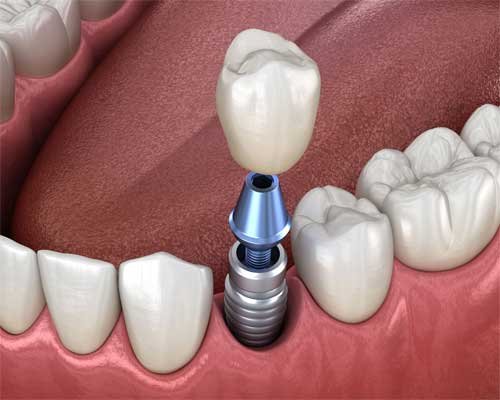
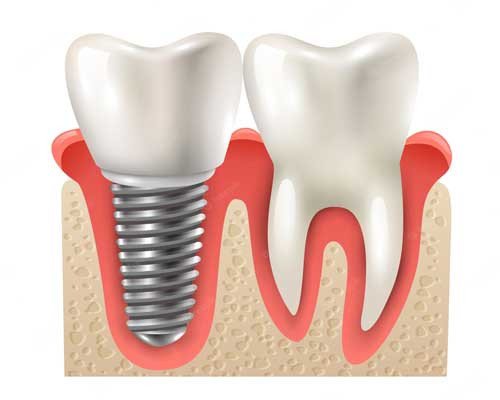
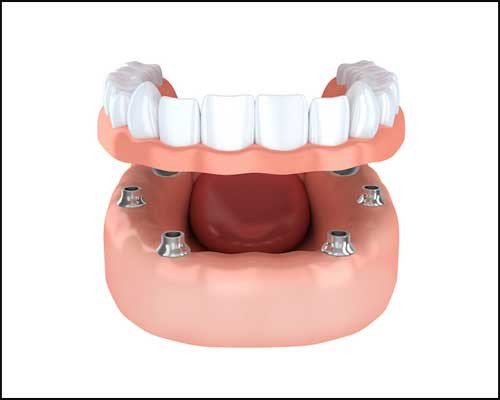
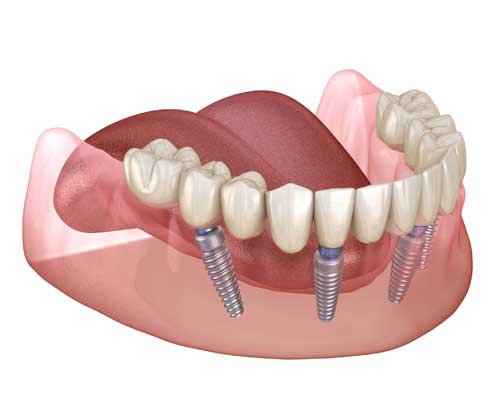
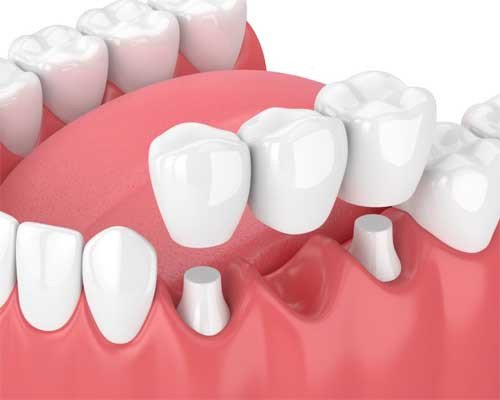

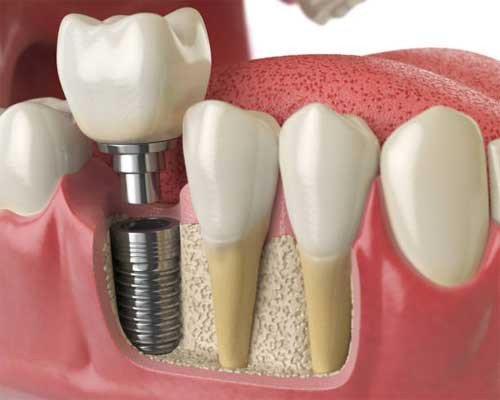
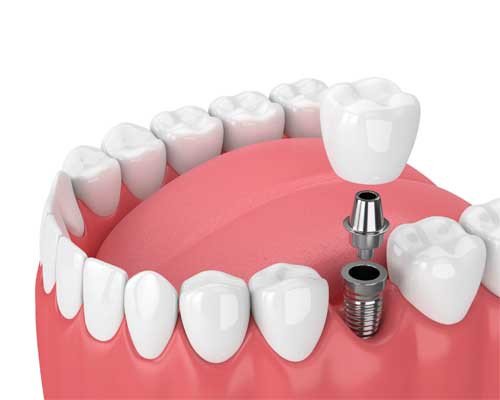










.jpg)








